选择热点
 荷兰莱顿大学
荷兰莱顿大学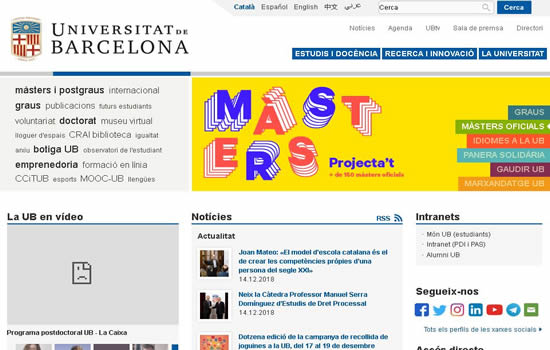 西班牙巴塞罗那大学
西班牙巴塞罗那大学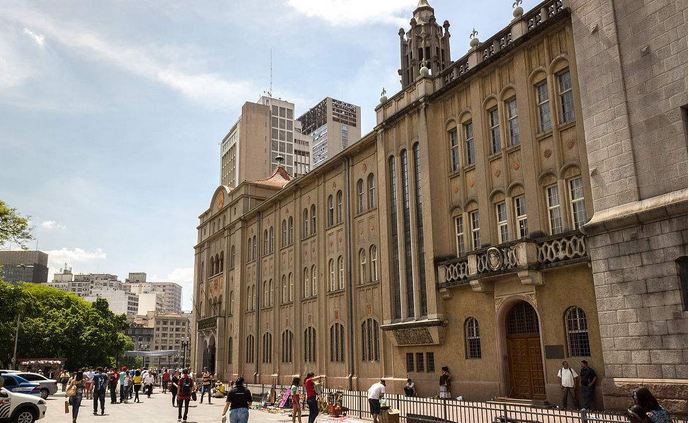 巴西圣保罗大学 University of Sao Paulo, Brazil
巴西圣保罗大学 University of Sao Paulo, Brazil 台湾南华大学 University of South China in Taiwan
台湾南华大学 University of South China in Taiwan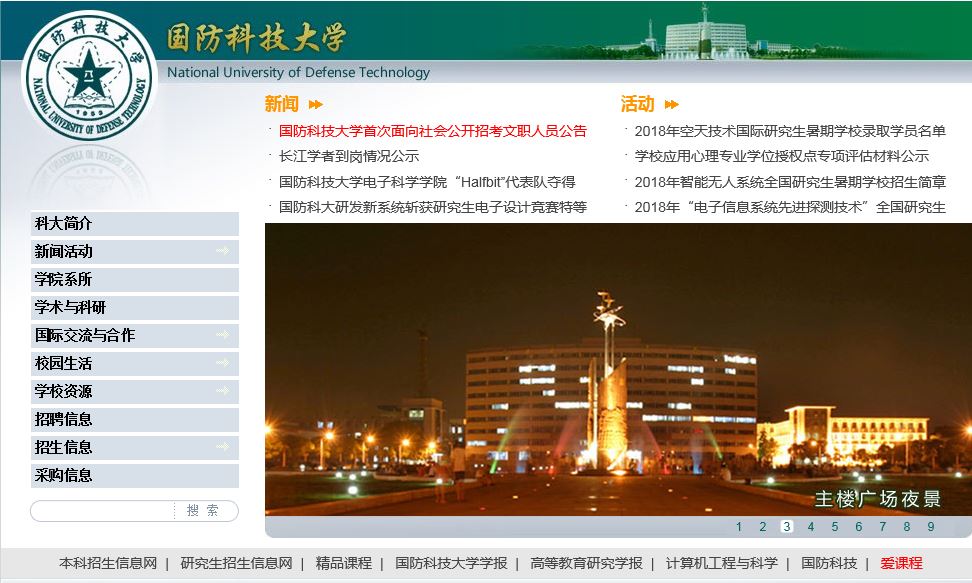 科技大学 National University of Defense Technology
科技大学 National University of Defense Technology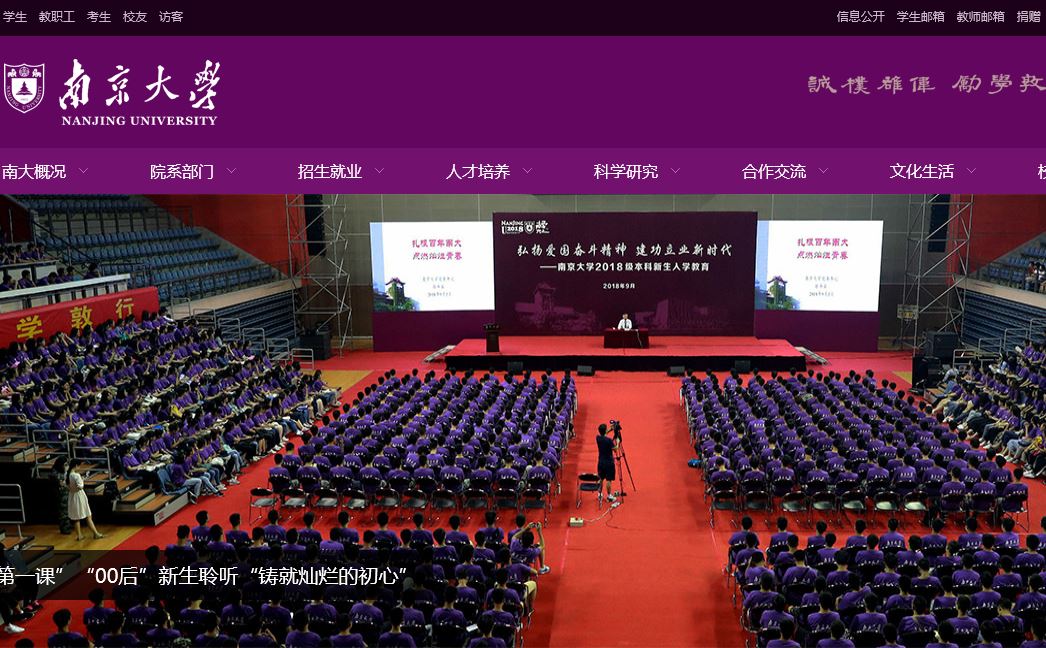 南京大学 Nanjing University
南京大学 Nanjing University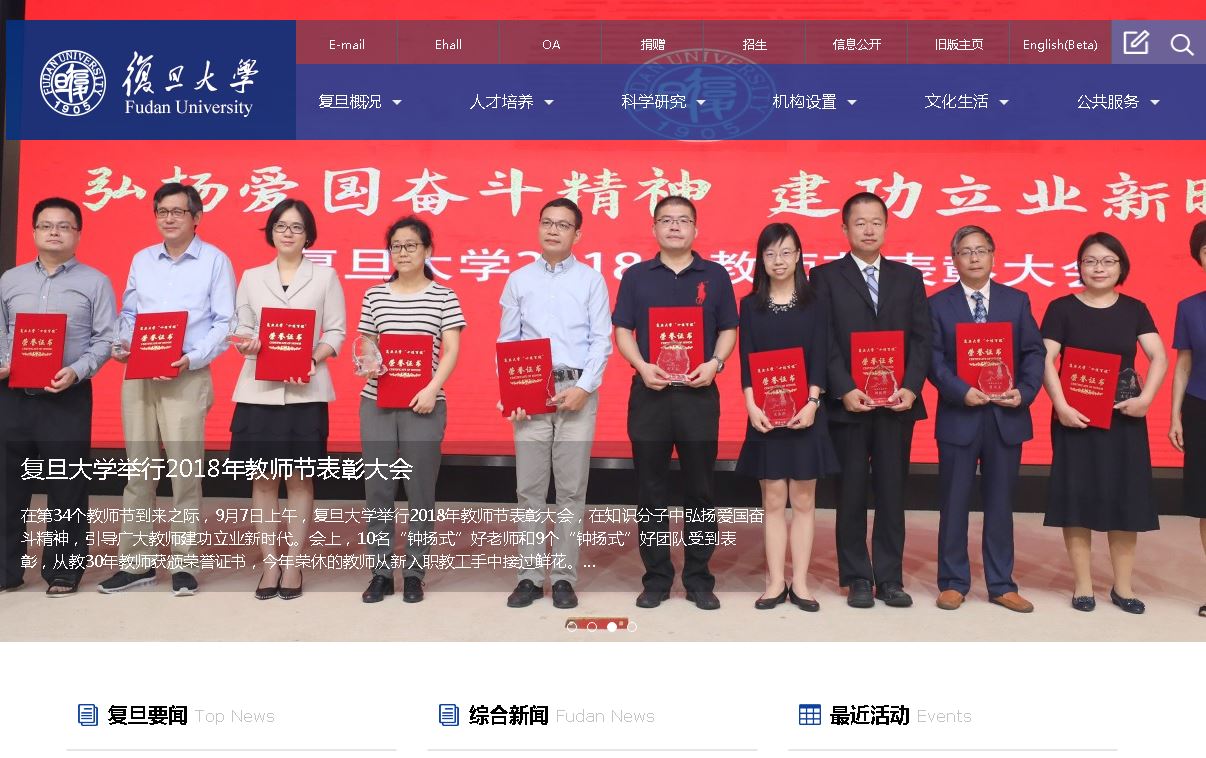 上海复旦大学 Fudan University
上海复旦大学 Fudan University 泗水大学(Ubaya)
泗水大学(Ubaya) 印尼大学 universitas indonesia
印尼大学 universitas indonesia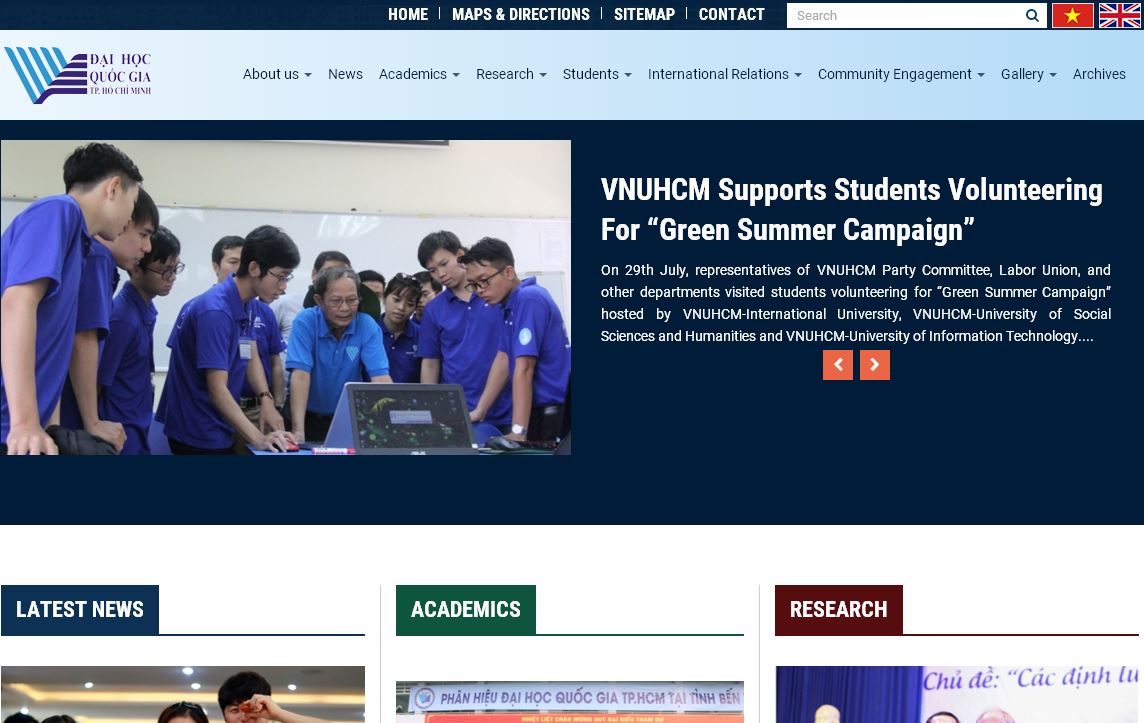 越南某大学 Vietnam National University
越南某大学 Vietnam National University 菲律宾大学 University Of The Philippines
菲律宾大学 University Of The Philippines
双语全文 ● 鲁迅——社戏
发布时间:2025-01-06
来源:大学网站
Village OperaIn the past twenty years only twice have I been to see Chinese opera.
During the first ten years I saw none, lacking both the wish and the opportunity.
The two occasions on which I went were in the last ten years,but each time I left without seeing anything in it.
The first time was in 1912 when I was new to Beijing.
A friend told me Beijing had the best opera and that seeing it was an experience not to be missed.
I thought it might be interesting to see an opera, especially in Beijing, and hurried in high spirits to some theatre, the name of which escapes me.
The performance had already started.
Even outside I could hear the beat of the drums.
As we squeezed in, gaudy colours flashed into view,then I saw many heads in the auditorium; but when I collected myself to look around there were still a few empty seats in the middle.
As I squeezed my way in to sit down, someone addressed me.
Already there was such a buzzing in my ears that I had to listen hard to catch what he was saying—“Sorry, these seats are taken!
”We withdrew to the back, but then a man with a glossy queue led us to one side and indicated an unoccupied place.
This was a bench only a quarter the width of my thighs, but with legs two-thirds longer than mine.
To begin with I hadn’t the courage to get up there.
Then, being reminded of some instrument of torture, with an involuntary shudder I fled.
I had gone some way when suddenly I heard my friend’s voice asking,“Well, What’s the matter?
” Looking over my shoulder I saw he had followed me out.
“Why are you marching along without a word?
” he inquired in great surprise.
“I’m sorry,” I told him.
“There’s such a dingdong skirling in my ears, I didn’t hear you.
”Whenever I thought back to this it struck me as most strange and I supposed that the opera had been a very poor one—or else a theatre was no place for me.
社戏我在倒数上去的二十年中,只看过两回中国戏,前十年是绝不看,因为没有看戏的意思和机会,那两回全在后十年,然而都没有看出什么来就走了。
第一回是民国元年我初到北京的时候,当时一个朋友对我说,北京戏最好,你不去见见世面么?
我想,看戏是有味的,而况在北京呢。
于是都兴致勃勃的跑到什么园,戏文已经开场了,在外面也早听到冬冬地响。
我们挨进门,几个红的绿的在我的眼前一闪烁,便又看见戏台下满是许多头,再定神四面看,却见中间也还有几个空座,挤过去要坐时,又有人对我发议论,我因为耳朵已经喤喤的响着了,用了心,才听到他是说“有人,不行!
”我们退到后面,一个辫子很光的却来领我们到了侧面,指出一个地位来。
这所谓地位者,原来是一条长凳,然而他那坐板比我的上腿要狭到四分之三,他的脚比我的下腿要长过三分之二。
我先是没有爬上去的勇气,接着便联想到私刑拷打的刑具,不由的毛骨悚然的走出了。
走了许多路,忽听得我的朋友的声音道,“究竟怎的?
我回过脸去,原来他也被我带出来了。
他很诧异的说,“怎么总是走,不答应?
”我说,“朋友,对不起,我耳朵只在冬冬喤喤的响,并没有听到你的话。
”后来我每一想到,便很以为奇怪,似乎这戏太不好,——否则便是我近来在戏台下不适于生存了。
I forget in what year I made the second venture, but funds were being raised for flood victims in Hubei and Tan Xinpei was still alive.
By paying two dollars for a ticket, you contributed money and could go to the Number One Theatre to see an opera with a cast made up for the most part of famous actors, one being Tan Xinpei simply had to be seen.
At that, I forgot the disastrous dingdong skirling of a few years before and went to the theatre—probably half because that precious ticket had cost so much that I would feel uncomfortable unless I used it.
I learned that Tan Xinpei made his appearance late in the evening, and the Number One Theatre was a modern one where you did not have to fight for your seat.
That reassured me, and I waited till nine o’clock before setting out.
To my surprise, just as before, it was full.
There was hardly any standing-room and I had to squeeze into the crowd at the rear to watch an actor singing and old woman’s part.
He had a paper spill burning at each corner of his mouth and there was devil-soldier beside him.
After racking my brains I guessed that this might be Maudgalyayana’s mother, because the next to come on was a monk.
Not recognizing the actor, I asked a fat gentleman squeezed in on my left who he was.
“Gong Yunfu!
” he said, throwing me a withering sidelong glance.
My face burned with shame over my ignorant blunder, and I mentally resolved at all costs to ask no more questions.
Then I watched a heroine and her maid sing, next an old man and some other characters I could not identify.
After that, I watched a whole group fight a free-for-all, and after that two or three people fighting together—from after nine till ten, from ten till eleven, from eleven till eleven-thirty, from eleven-thirty till twelve—but still there was no sign of Tan Xinpei.
Never in my life have I waited so patiently for anything.
But the wheezes of the fat gentleman next to me, the dingdong skirling, gonging and drumming on the stage, the whirling of gaudy colours, combined with the lateness of the hour, suddenly made me realize that this was no place for me.
Mechanically turning round, I tried with might and main to shove my way out and felt the place behind me fill up at once—no doubt the elastic fat gentleman had expanded his right side into the space I vacated.
With my retreat cut off, naturally there was nothing to do but push and push till at last I was out of the door.
Apart from the rickshaws waiting for playgoers,there were practically no pedestrians in the street; but there were still a dozen or so people by the gate looking up at the programme, and another group not looking at anything who must, I thought, be waiting to watch the women come out after the show ended.
And still no sign of Tan Xinpei第二回忘记了那一年,总之是募集湖北水灾捐而谭叫天还没有死。
捐法是两元钱买一张戏票,可以到第一舞台去看戏,扮演的多是名角,其一就是小叫天。
我买了一张票,本是对于劝募人聊以塞责的,然而似乎又有好事家乘机对我说了些叫天不可不看的大法要了。
我于是忘了前几年的冬冬喤喤之灾,竟到第一舞台去了,但大约一半也因为重价购来的宝票,总得使用了才舒服。
我打听得叫天出台是迟的,而第一舞台却是新式构造,用不着争座位,便放了心,延宕到九点钟才出去,谁料照例,人都满了,连立足也难,我只得挤在远处的人丛中看一个老旦在台上唱。
那老旦嘴边插着两个点火的纸捻子,旁边有一个鬼卒,我费尽思量,才疑心他或者是目连的母亲,因为后来又出来了一个和尚。
然而我又不知道那名角是谁,就去问挤小在我的左边的一位胖绅士。
他很看不起似的斜瞥了我一眼,说道,“龚云甫!
”我深愧浅陋而且粗疏,脸上一热,同时脑里也制出了决不再问的定章,于是看小旦唱,看花旦唱,看老生唱,看不知什么角色唱,看一大班人乱打,看两三个人互打,从九点多到十点,从十点到十一点,从十一点到十一点半,从十一点半到十二点,——然而叫天竟还没有来。
我向来没有这样忍耐的等候过什么事物,而况这身边的胖绅士的吁吁的喘气,这台上的冬冬喤喤的敲打,红红绿绿的晃荡,加之以十二点,忽而使我省悟到在这里不适于生存了。
我同时便机械的拧转身子,用力往外只一挤,觉得背后便已满满的,大约那弹性的胖绅士早在我的空处胖开了他的右半身了。
我后无回路,自然挤而又挤,终于出了大门。
街上除了专等看客的车辆之外,几乎没有什么行人了,大门口却还有十几个人昂着头看戏目,别有一堆人站着并不看什么,我想:他们大概是看散戏之后出来的女人们的,而叫天却还没有来……But the night air was so crisp, it really “seeped into my heart.
” This seemed to be the first time I had known such good air in Beijing.
I said goodbye to Chinese opera that night, never thinking about it again, and if by any chance I passed a theatre it meant nothing to me for in spirit we were long since poles apart.
A few days ago, however, I happened to read a Japanese book—unfortunately I have forgotten the title and author, but it was about Chinese opera.
One chapter made the point that Chinese opera is so full of gongs and cymbals, shouting and leaping, that it makes the spectators’ heads swim and is quite unsuited for a theatre; if performed in the open and watched from a distance, it has its charm.
I felt that this put into words what had remained unformulated in my mind, because as a matter of fact I clearly remembered seeing a really good opera in the country and it was under its influence,perhaps, that after coming to Beijing I went twice to the theatre.
It is a pity that, somehow or other, the name of that book escapes me.
As to when I saw that good opera, it was really “long, long ago,” when I could not have been much more than eleven or twelve.
It was the custom in Luzhen where we lived for married women not yet in charge of the household to go back to their parents’ home for the summer.
Although my father’s mother was then still quite strong, my mother had quite a few domestic duties which made it impossible for her to spend many days at her old home during the summer.
All she could spare was a few days after visiting the ancestral graves, and at such times I always went with her to stay in her parents’ house.
That was in Pingqiao Village not far from the sea,a very remote little village on a river with less than thirty households of peasants and fishermen, and just one tiny grocery.
To me, however, it was heaven, for not only was I treated as a guest of honour but here I could skip reading the Book of Songs.
然而夜气很清爽,真所谓“沁人心脾”,我在北京遇着这样的好空气,仿佛这是第一遭了。
这一夜,就是我对于中国戏告了别的一夜,此后再没有想到他,即使偶而经过戏园,我们也漠不相关,精神上早已一在天之南一在地之北了。
但是前几天,我忽在无意之中看到一本日本文的书,可惜忘记了书名和著者,总之是关于中国戏的。
其中有一篇,大意仿佛说,中国戏是大敲,大叫,大跳,使看客头昏脑弦,很不适于剧场,但若在野外散漫的所在,远远的看起来,也自有他的风致。
我当时觉着这正是说了在我意中而未曾想到的话,因为我确记得在野外看过很好的好戏,到北京以后的连进两回戏园去,也许还是受了那时的影响哩。
可惜我不知道怎么一来,竟将书名忘却了。
至于我看那好戏的时候,却实在已经是“远哉遥遥”的了,其时恐怕我还不过十一二岁。
我们鲁镇的习惯,本来是凡有出嫁的女儿,倘自己还未当家,夏间便大抵回到母家去消夏。
那时我的祖母虽然还康健,但母亲也已分担了些家务,所以夏期便不能多日的归省了,只得在扫墓完毕之后,抽空去住几天,这时我便每年跟了我的母亲住在外祖母的家里。
那地方叫平桥村,是一个离海边不远,极偏僻的,临河的小村庄;住户不满三十家,都种田,打鱼,只有一家很小的杂货店。
但在我是乐土:因为我在这里不但得到优待,又可以免念“秩秩斯干幽幽南山”了。
There were many children for me to play with.
For with the arrival of a visitor from such a distance they got leave from their parents to do less work in order to play with me.
In a small village, the guest of one family is virtually the guest of the whole community.
We were all about the same age,but when it came to determining seniority many were at least my uncles or granduncles, since everybody in the village had the same family name and belonged to one clan.
But we were all good friends, and if by some chance we fell out and I hit one of my granduncles, it never occurred to any child or grown-up in the village to call me “insubordinate.
” Ninety-nine out of a hundred of them could neither read nor write.
We spent most of our days digging up earthworms, putting them on little hooks made of copper wire, and lying on the river bank to catch prawns.
The silliest of water creatures, prawns willingly use their own pincers to push the point of the hook into their mouths; so in a few hours we could catch a big bowlful.
It was the custom to give these prawns to me.
Another thing we did was to graze buffaloes together.
But, maybe because they are animals of a higher order, oxen and buffaloes are hostile to strangers, and they treated me with such contempt that I never dared get too close.
I could only follow at a distance and stand there.
At such times my small friends, no longer impressed by my ability to recite classical poetry,would all start hooting with laughter.
What I looked forward to most was going to Zhaozhuang to see the opera.
Zhaozhuang was a slightly larger village five li away.
Since Pingqiao was too small to afford to put on operas, every year it chipped in towards a performance at Zhaozhuang.
At the time, it never occurred to me to wonder why they should put on operas every year.
Thinking back to it now, I dare say it may have been a ritual drama for the late spring festival.
The year that I was eleven or twelve, this long-awaited day came round again.
But as ill luck would have it, there was no boat for hire that morning.
Pingqiao Village had only one big ferry-boat, which put out in the morning and came back in the evening, and it was out of the question to use this.
All the other boats were unsuitable, being too small.
And the neighbouring villages, when people were sent to ask, had no boats either—they had all been hired already.
My grandmother, very vexed, blamed the family for not hiring one earlier and started nagging.
To console her, Mother said that our operas at Luzhen were much better than in these little villages, and as we saw several a year there was no need to go today.
But I was nearly in tears from chagrin, and Mother did her best to impress on me on no account to make a scene, because it would upset my grandmother; nor must I got with other people either, or Grandmother might worry.
和我一同玩的是许多小朋友,因为有了远客,他们也都从父母那里得了减少工作的许可,伴我来游戏。
在小村里,一家的客,几乎也就是公共的。
我们年纪都相仿,但论起行辈来,却至少是叔子,有几个还是太公,因为他们合村都同姓,是本家。
然而我们是朋友,即使偶而吵闹起来,打了太公,一村的老老小小,也决没有一个会想出“犯上”这两个字来,而他们也百分之九十九不识字。
我们每天的事情大概是掘蚯蚓,掘来穿在铜丝的小钩上,伏在河沿上去钓虾。
虾是水世界里的呆子,决不惮用了自己的两个钳捧着钩尖送到嘴里去的,所以不半天便可以钓到一大碗。
这虾照例是归我吃的。
其次便是一同去放牛,但或者因为高等动物了的缘故罢,黄牛水牛都欺生,敢于欺侮我,因此我也总不敢走近身,只好远远地跟着,站着。
这时候,小朋友们便不再原谅我会读“秩秩斯干”,却全都嘲笑起来了。
至于我在那里所第一盼望的,却在到赵庄去看戏。
赵庄是离平桥村五里的较大的村庄;平桥村太小,自己演不起戏,每年总付给赵庄多少钱,算作合做的。
当时我并不想到他们为什么年年要演戏。
现在想,那或者是春赛,是社戏了。
就在我十一二岁时候的这一年,这日期也看看等到了。
不料这一年真可惜,在早上就叫不到船。
平桥村只有一只早出晚归的航船是大船,决没有留用的道理。
其余的都是小船,不合用;央人到邻村去问,也没有,早都给别人定下了。
外祖母很气恼,怪家里的人不早定,絮叨起来。
母亲便宽慰伊,说我们鲁镇的戏比小村里的好得多,一年看几回,今天就算了。
只有我急得要哭,母亲却竭力的嘱咐我,说万不能装模作样,怕又招外祖母生气,又不准和别人一同去,说是怕外祖母要担心。
In a word, it had fallen through.
In the afternoon, when all my friends had left and the opera had started, I imagined I could hear the sound of gongs and drums and knew they were in front of the stage buying soyabean milk to drink.
I caught no prawns that day, did not eat much either.
Mother was very upset but could not think what to do.
By supper time Grandmother too had finally caught on and she said I was right to be cross, they had been too remiss, and never before had guests been treated so badly.
After the meal,youngsters back from the opera gathered round and gaily described it to us.
I was the only one silent.
They all sighed and said how sorry they were for me.
Suddenly one of the brightest, Shuangxi, had an inspiration and asked,“A big boat?
Hasn’t Eighth Granduncle’s ferry-boat come back?
” A dozen other boys cottoned on and at once started agitating to take the boat and go with me.
I cheered up.
But Grandmother was nervous, thinking we were all children and undependable.
And Mother said it would not be fair to ask grown-ups to stay up all night and go with us, as they all had to work the next day.
While our fate hung in the balance, Shuangxi went to the root of the problem, declaring loudly, “I guarantee it’ll be all right!
It’s a big boat,Brother Xun never jumps around, and all of us can swim!
”It was true.
Not a boy in the dozen but could swim, and two or three of them were first-rate swimmers in the sea.
总之,是完了。
到下午,我的朋友都去了,戏已经开场了,我似乎听到锣鼓的声音,而且知道他们在戏台下买豆浆喝。
这一天我不钓虾,东西也少吃。
母亲很为难,没有法子想。
到晚饭时候,外祖母也终于觉察了,并且说我应当不高兴,他们太怠慢,是待客的礼数里从来所没有的。
吃饭之后,看过戏的少年们也都聚扰来了,高高兴兴的来讲戏。
只有我不开口;他们都叹息而且表同情。
忽然间,一个最聪明的双喜大悟似的提议了,他说,“大船?
八叔的航船不是回来了么?
”十几个别的少年也大悟,立刻撺掇起来,说可以坐了这航船和我一同去。
我高兴了。
然而外祖母又怕都是孩子们,不可靠;母亲又说是若叫大人一同去,他们白天全有工作,要他熬夜,是不合情理的。
在这迟疑之中,双喜可又看出底细来了,便又大声的说道,“我写包票!
船又大;迅哥儿向来不乱跑;我们又都是识水性的!
”诚然!
这十多个少年,委实没有一个不会凫水的,而且两三个还是弄潮的好手。
Grandmother and Mother, convinced, raised no further objections.
Both smiled.
We immediately rushed out.
My heart after being so heavy was suddenly light, and I felt as though floating on air.
Once outside, I saw in the moonlight a ferry-boat with a white awning moored at the bridge.
We all jumped aboard, Shuangxi seizing the front pole and Afa the back one, while the younger boys sat down with me in the middle and those a little older went to the stern.
By the time Mother followed us out to warn “Be carefull!
” we had already cast off.
We pushed off from the bridge, floated back a few feet, then moved forward under the bridge.
Two oars were set up, each manned by two boys who changed shifts every li.
Chatter, laughter and shouts mingled with the lapping of water against our bow; to our right and left stretched emerald green fields of beans and wheat, as we flew forward towards Zhaozhuang.
The scent of beans, wheat and river-weeds wafted towards us through the mist, and the moonlight shone faintly through it.
Distant grey hills,undulating like the backs of some leaping iron beasts, seemed to be racing past the stern of our boat; but I still felt our progress was slow.
When the oarsmen had changed shifts four times, we began to make out the faint outline of Zhaozhuang and to catch the sound of singing and music.
There were several lights too, which we guessed must be on the stage unless they were fishermen’s lights.
The music was probably fluting.
Eddying round and round and up and down, it soothed me and set me dreaming at the same time, till I felt as though I was about to drift far away with it through the night air heavy with the scent of beans, wheat and river-weeds.
As we approached the lights, they proved to be fishermen’s lights and I realized it was not Zhaozhuang that I had been looking at.
Directly ahead of us was a pine-wood where I had played the year before and seen a broken stone horse, fallen on its side, as well as a stone sheep couched in the grass.
Once past the wood, our boat rounded a bend into a cove, and Zhaozhuang was really before us.
外祖母和母亲也相信,便不再驳回,都微笑了。
我们立刻一哄的出了门。
我的很重的心忽而轻松了,身体也似乎舒展到说不出的大。
一出门,便望见月下的平桥内泊着一只白篷的航船,大家跳下船,双喜拔前篙,阿发拔后篙,年幼的都陪我坐在舱中,较大的聚在船尾。
母亲送出来吩咐“要小心”的时候,我们已经点开船,在桥石上一磕,退后几尺,即又上前出了桥。
于是架起两支橹,一支两人,一里一换,有说笑的,有嚷的,夹着潺潺的船头激水的声音,在左右都是碧绿的豆麦田地的河流中,飞一般径向赵庄前进了。
两岸的豆麦和河底的水草所发散出来的清香,夹杂在水气中扑面的吹来;月色便朦胧在这水气里。
淡黑的起伏的连山,仿佛是踊跃的铁的兽脊似的,都远远地向船尾跑去了,但我却还以为船慢。
他们换了四回手,渐望见依稀的赵庄,而且似乎听到歌吹了,还有几点火,料想便是戏台,但或者也许是渔火。
那声音大概是横笛,宛转,悠扬,使我的心也沉静,然而又自失起来,觉得要和他弥散在含着豆麦蕴藻之香的夜气里。
那火接近了,果然是渔火;我才记得先前望见的也不是赵庄。
那是正对船头的一丛松柏林,我去年也曾经去游玩过,还看见破的石马倒在地上,一个石羊蹲在草里呢。
过了那林,船便弯进了叉港,于是赵庄便真在眼前了。
Our eyes were drawn to stage standing in a plot of empty ground by the river outside the village, hazy in the distant moonlight, barely distinguishable from its surroundings.
It seemed that the fairyland I had seen in pictures had come alive here.
The boat was moving faster now, and presently we could make out figures on the stage and a blaze of gaudy colours.
The river close to the stage was black with the boat awnings of the spectators.
“There’s no room near the stage, let’s watch from a distance,” suggested Afa.
The boat had slowed down now, and soon we arrived.
True enough, it was impossible to get close to the stage.
We had to make fast even further away from it than the shrine opposite.
But, in any case, we did not want our boat with its white awning to mix with those black ones and, besides, there was no roomWhile we hastily moored, there appeared on the stage a man with a long black beard and four pennons fixed to his back.
With a spear he fought a whole group of bare-armed men.
Shuangxi told us this was a famous acrobat who could turn eighty-four somersaults one after the other.
He had counted for himself earlier in the day.
We all crowded to the bow to watch the fighting, but the acrobat did not turn any somersaults.
Only a few of the bare-armed men turned over heels a few times, then trooped off.
Then a girl came out and sang in a shrill falsetto.
“There aren’t many watching in the evening,” said Shuangxi, “and the acrobat’s taking it easy.
Who wants to show off to an empty house?
”That made sense to me, because by then there were not many spectators.
The country folk, having work to do the next day, could not stay up all night and had gone home to bed.
Standing there still were just a scattering of a few dozen idlers from Zhaozhuang and the villages around.
The families of the local rich remained in the boats with black awnings, but they were not really interested in the opera.
Most of them had come to the opera to eat cakes, fruit or melon-seeds.
So it could really be reckoned an empty house.
As a matter of fact, I was not too keen on somersaults either.
What I wanted most to see was a snake spirit swathed in white, its two hands clasping above it a wand-like snake’s head, and next a leaping tiger dressed in yellow.
But I waited a long time in vain.
As soon as the girl left, out came a very old man acting the part of a young one.
Feeling tired, I asked Guisheng to buy me some soyabean milk.
He came back presently to say,“There isn’t any.
The deaf man who sells it has gone.
There was some in the daytime, I drank two bowls then.
I’ll get you a dipperful of water to drink.
”最惹眼的是屹立在庄外临河的空地上的一座戏台,模胡在远处的月夜中,和空间几乎分不出界限,我疑心画上见过的仙境,就在这里出现了。
这时船走得更快,不多时,在台上显出人物来,红红绿绿的动,近台的河里一望乌黑的是看戏的人家的船篷。
“近台没有什么空了,我们远远的看罢。
”阿发说。
这时船慢了,不久就到,果然近不得台旁,大家只能下了篙,比那正对戏台的神棚还要远。
其实我们这白篷的航船,本也不愿意和乌篷的船在一处,而况并没有空地呢……在停船的匆忙中,看见台上有一个黑的长胡子的背上插着四张旗,捏着长枪,和一群赤膊的人正打仗。
双喜说,那就是有名的铁头老生,能连翻八十四个筋斗,他日里亲自数过的。
我们便都挤在船头上看打仗,但那铁头老生却又并不翻筋斗,只有几个赤膊的人翻,翻了一阵,都进去了,接着走出一个小旦来,咿咿呀呀的唱。
双喜说,“晚上看客少,铁头老生也懈了,谁肯显本领给白地看呢?
”我相信这话对,因为其时台下已经不很有人,乡下人为了明天的工作,熬不得夜,早都睡觉去了,疏疏朗朗的站着的不过是几十个本村和邻村的闲汉。
乌篷船里的那些土财主的家眷固然在,然而他们也不在乎看戏,多半是专到戏台下来吃糕饼水果和瓜子的。
所以简直可以算白地。
然而我的意思却也并不在乎看翻筋斗。
我最愿意看的是一个人蒙了白布,两手在头上捧着一支棒似的蛇头的蛇精,其次是套了黄布衣跳老虎。
但是等了许多时都不见,小旦虽然进去了,立刻又出来了一个很老的小生。
我有些疲倦了,托桂生买豆浆去。
他去了一刻,回来说,“没有。
卖豆浆的聋子也回去了。
日里倒有,我还喝了两碗呢。
现在去舀一瓢水来给你喝罢。
”Instead of drinking the water, I stuck it out as best I could.
I cannot say what I saw, but by degrees something strange seemed to happen to the faces of the players, whose features blurred as if melting into one flattened surface.
Most of the younger boys yawned, while the older ones chatted among themselves.
It was only when clown in a red shirt was fastened to a pillar on the stage, and a greybeard started horsewhipping him, that we roused ourselves to watch again and laughed.
I really think that was the best scene of the evening.
But then the old woman came out.
This was the character I dreaded most, especially when she sat down to sing.
Now I saw by everybody’s disappointment that they felt just as I did.
To start with, the old woman simply walked to and fro singing, then she sat on a chair in the middle of the stage.
I felt most dismayed, and Shuangxi and the rest started swearing.
I waited patiently till, after a long time, the old woman raised her hand.
I thought she was going to stand up.
But dashing my hopes she lowered her hand slowly again just as before, and went on singing.
Some of the boys in the boat could not help groaning; the rest began to yawn again.
Finally Shuangxi, when he could stand it no longer, said he was afraid she might go on singing till dawn and we had better leave.
We all promptly agreed,becoming as eager as when we had set out.
Three or four boys ran to the stern, seized the poles to punt back several yards, then headed the boat around.
Cursing the old woman, they set up the oars and started back for the pine-wood.
Judging by the position of the moon we had not been watching very long, and once we left Zhaozhuang the moonlight seemed unusually bright.
When we turned back to look at the lanternlit stage, it appeared just as it had been when we came, hazy as a fairy pavilion, covered in a rosy mist.
Once again the flutes sounded melodiously in our ears.
I suspected that the old woman must have finished, but could hardly suggest going back again to see.
我不喝水,支撑着仍然看,也说不出见了些什么,只觉得戏子的脸都渐渐的有些稀奇了,那五官渐不明显,似乎融成一片的再没有什么高低。
年纪小的几个多打呵欠了,大的也各管自己谈话。
忽而一个红衫的小丑被绑在台柱子上,给一个花白胡子的用马鞭打起来了,大家才又振作精神的笑着看。
在这一夜里,我以为这实在要算是最好的一折。
然而老旦终于出台了。
老旦本来是我所最怕的东西,尤其是怕他坐下了唱。
这时候,看见大家也都很扫兴,才知道他们的意见是和我一致的。
那老旦当初还只是踱来踱去的唱,后来竟在中间的一把交椅上坐下了。
我很担心;双喜他们却就破口喃喃的骂。
我忍耐的等着,许多工夫,只见那老旦将手一抬,我以为就要站起来了,不料他却又慢慢的放下在原地方,仍旧唱。
全船里几个人不住的吁气,其余的也打起呵欠来。
双喜终于熬不住了,说道,怕他会唱到天明还不完,还是我们走的好罢。
大家立刻都赞成,和开船时候一样踊跃,三四人径奔船尾,拔了篙,点退几丈,回转船头,架起橹,骂着老旦,又向那松柏林前进了。
月还没有落,仿佛看戏也并不很久似的,而一离赵庄,月光又显得格外的皎洁。
回望戏台在灯火光中,却又如初来未到时候一般,又漂渺得像一座仙山楼阁,满被红霞罩着了。
吹到耳边来的又是横笛,很悠扬;我疑心老旦已经进去了,但也不好意思说再回去看。
Soon the pine-wood was behind us.
Our boat was moving fairly fast,but there was such thick darkness all around you could tell it was very late.
As they discussed the players, laughing and swearing, the rowers pulled harder on the oars.
Now the plash of water against our bow was even more distinct.
The ferry-boat seemed like a great white fish carrying a freight of children through the foam.
Some old fishermen who fished all night stopped their punts to cheer at the sight.
We were still about one li from Pingqiao when our boat slowed down,the oarsmen saying that they were tired after rowing so hard, with nothing to eat for hours.
It was Guisheng who had a bright idea this time.
He said the broad beans were just ripe, and there was fuel on the boat—we could filch some beans and cook them.
Everybody approving, we promptly drew alongside the bank and stopped.
The pitch-black fields were filled with plump broad beans.
“Hey, Afa!
They’re your family’s over here, and Old Liu Yi’s over there.
Which shall we take?
” Shuangxi, the first to leap ashore, called from the bank.
As we all jumped ashore too Afa said, “Wait a bit and I’ll have a look.
”He walked up and down feeling the beans, then straightened up to say,“Take ours, they’re much bigger.
” With a shout we scattered through his family’s bean field, each picking a big handful of beans and throwing them into the boat.
Shuangxi thought that if we took any more and Afa’s mother found out, she would make a scene, so we all went to Old Liu Yi’s field to pick another handful each.
Then a few of the older boys started rowing slowly again, while others lit a fire in the stern and the younger boys and I shelled the beans.
Soon they were cooked, and we let the boat drift while we gather round and ate them with our fingers.
When the beans were finished we went on again, washing the pot and throwing the pods into the river, to destroy all traces.
What worried Shuangxi now was that we had used the salt and firewood on Eighth Granduncle’s boat, and being a canny old man he was sure to find out and berate us.
But after some discussion we decided that we had nothing to fear.
If he swore at us, we would ask him to return the tallow branch he had taken the previous year from the river bank, and to his face call him “Old Scabby.
”不多久,松柏林早在船后了,船行也并不慢,但周围的黑暗只是浓,可知已经到了深夜。
他们一面议论着戏子,或骂,或笑,一面加紧的摇船。
这一次船头的激水声更其响亮了,那航船,就像一条大白鱼背着一群孩子在浪花里蹿,连夜渔的几个老渔父,也停了艇子看着喝采起来。
离平桥村还有一里模样,船行却慢了,摇船的都说很疲乏,因为太用力,而且许久没有东西吃。
这回想出来的是桂生,说是罗汉豆正旺相,柴火又现成,我们可以偷一点来煮吃的。
大家都赞成,立刻近岸停了船;岸上的田里,乌油油的便都是结实的罗汉豆。
“阿阿,阿发,这边是你家的,这边是老六一家的,我们偷那一边的呢?
”双喜先跳下去了,在岸上说。
我们也都跳上岸。
阿发一面跳,一面说道,“且慢,让我来看一看罢,”他于是往来的摸了一回,直起身来说道,“偷我们的罢,我们的大得多呢。
”一声答应,大家便散开在阿发家的豆田里,各摘了一大捧,抛入船舱中。
双喜以为再多偷,倘给阿发的娘知道是要哭骂的,于是各人便到六一公公的田里又各偷了一大捧。
我们中间几个年长的仍然慢慢的摇着船,几个到后舱去生火,年幼的和我都剥豆。
不久豆熟了,便任凭航船浮在水面上,都围起来用手撮着吃。
吃完豆,又开船,一面洗器具,豆荚豆壳全抛在河水里,什么痕迹也没有了。
双喜所虑的是用了八公公船上的盐和柴,这老头子很细心,一定要知道,会骂的。
然而大家议论之后,归结是不怕。
他如果骂,我们便要他归还去年在岸边拾去的一枝枯桕树,而且当面叫他“八癞子”。
“We’re all back!
How could anything go wrong?
Didn’t I guarantee that?
” Shuangxi’s voice suddenly rang out from the bow.
Looking past him, I saw we were already at Pingqiao and someone was standing at the foot of the bridge—it was my mother to whom Shuangxi had called.
As I walked up to the bow the boat passed under the bridge, then stopped, and we all went ashore.
Mother was rather angry.
She asked why we had come back so late—it was after midnight.
But she was pleased to see us too and smilingly invited everyone to go and have some puffed rice.
They told her we had all had a snack to eat and were sleepy, so we had better get to bed at once, and off we all went to our different homes.
I did not get up till noon the next day, and there was no word of any trouble with Eighth Granduncle over the salt or firewood.
That afternoon we went to catch prawns as usual.
“Shuangxi, you little devils stole my beans yesterday!
And instead of picking them properly you trampled down quite a few.
” I looked up and saw Old Liu Yi on a punt, coming back from selling beans.
There was still a heap of left-over beans at the bottom of the punt.
“Yes, we were treating a visitor.
We didn’t mean to take yours to begin with,” said Shuangxi.
“Look!
you’ve frightened away my prawn!
”When the old man saw me, he stopped punting and chuckled,“Treating a visitor?
So you should.
” Then he asked me, “Was yesterday’s opera good, Brother Xun?
”I nodded.
“Yes, it was.
”“Did you enjoy the beans?
”“都回来了!
那里会错。
我原说过写包票的!
”双喜在船头上忽而大声的说。
我向船头一望,前面已经是平桥。
桥脚上站着一个人,却是我的母亲,双喜便是对伊说着话。
我走出前舱去,船也就进了平桥了,停了船,我们纷纷都上岸。
母亲颇有些生气,说是过了三更了,怎么回来得这样迟,但也就高兴了,笑着邀大家去吃炒米。
大家都说已经吃了点心,又渴睡,不如及早睡的好,各自回去了。
第二天,我向午才起来,并没有听到什么关系八公公盐柴事件的纠葛,下午仍然去钓虾。
“双喜,你们这班小鬼,昨天偷了我的豆了罢?
又不肯好好的摘,踏坏了不少。
”我抬头看时,是六一公公棹着小船,卖了豆回来了,船肚里还有剩下的一堆豆。
“是的。
我们请客。
我们当初还不要你的呢。
你看,你把我的虾吓跑了!
”双喜说。
六一公公看见我,便停了楫,笑道,“请客?
——这是应该的。
”于是对我说,“迅哥儿,昨天的戏可好么?
”我点一点头,说道,“好。
”“豆可中吃呢?
”I nodded again.
“Very much.
”To my surprise, that gratified Old Liu Yi enormously.
Sticking up one thumb he said complacently, “People from big towns who have studied really know What’s good!
I select my bean seeds one by one, yet country folk who can’t tell good from bad say my beans aren’t up to other people’s.
I’ll give some to your mother today for her to try” With that he punted off.
When Mother called me home for supper, on the table there was a large bowl of boiled beans which Old Liu Yi had brought for the two of us.
And I heard he had praised me highly to Mother, saying, “He’s so young, yet he knows What’s what.
He’s sure to come first in the official examinations in future.
Your fortune’s as good as made, ma’am.
” But when I ate the beans,they did not taste as those of the night before.
It is a fact, right up till now, I have really never eaten such good beans or seen such a good opera as I did that night.
Oct-22我又点一点头,说道,“很好。
”不料六一公公竟非常感激起来,将大拇指一翘,得意的说道,“这真是大市镇里出来的读过书的人才识货!
我的豆种是粒粒挑选过的,乡下人不识好歹,还说我的豆比不上别人的呢。
我今天也要送些给我们的姑奶奶尝尝去……”他于是打着楫子过去了。
待到母亲叫我回去吃晚饭的时候,桌上便有一大碗煮熟了的罗汉豆,就是六一公公送给母亲和我吃的。
听说他还对母亲极口夸奖我,说“小小年纪便有见识,将来一定要中状元。
姑奶奶,你的福气是可以写包票的了。
”但我吃了豆,却没有昨夜的豆那么好。
真的,一直到现在,我实在再没有吃到那夜似的好豆,——也不再看到那夜似的好戏了。
一九二二年十月。
最惹眼的是屹立在庄外临河的空地上的一座戏台,模胡在远处的月夜中,和空间几乎分不出界限,我疑心画上见过的仙境,就在这里出现了。
这时船走得更快,不多时,在台上显出人物来,红红绿绿的动,近台的河里一望乌黑的是看戏的人家的船篷。
【双语全文 ● 鲁迅——社戏查看网站:[db:时间]】
During the first ten years I saw none, lacking both the wish and the opportunity.
The two occasions on which I went were in the last ten years,but each time I left without seeing anything in it.
The first time was in 1912 when I was new to Beijing.
A friend told me Beijing had the best opera and that seeing it was an experience not to be missed.
I thought it might be interesting to see an opera, especially in Beijing, and hurried in high spirits to some theatre, the name of which escapes me.
The performance had already started.
Even outside I could hear the beat of the drums.
As we squeezed in, gaudy colours flashed into view,then I saw many heads in the auditorium; but when I collected myself to look around there were still a few empty seats in the middle.
As I squeezed my way in to sit down, someone addressed me.
Already there was such a buzzing in my ears that I had to listen hard to catch what he was saying—“Sorry, these seats are taken!
”We withdrew to the back, but then a man with a glossy queue led us to one side and indicated an unoccupied place.
This was a bench only a quarter the width of my thighs, but with legs two-thirds longer than mine.
To begin with I hadn’t the courage to get up there.
Then, being reminded of some instrument of torture, with an involuntary shudder I fled.
I had gone some way when suddenly I heard my friend’s voice asking,“Well, What’s the matter?
” Looking over my shoulder I saw he had followed me out.
“Why are you marching along without a word?
” he inquired in great surprise.
“I’m sorry,” I told him.
“There’s such a dingdong skirling in my ears, I didn’t hear you.
”Whenever I thought back to this it struck me as most strange and I supposed that the opera had been a very poor one—or else a theatre was no place for me.
社戏我在倒数上去的二十年中,只看过两回中国戏,前十年是绝不看,因为没有看戏的意思和机会,那两回全在后十年,然而都没有看出什么来就走了。
第一回是民国元年我初到北京的时候,当时一个朋友对我说,北京戏最好,你不去见见世面么?
我想,看戏是有味的,而况在北京呢。
于是都兴致勃勃的跑到什么园,戏文已经开场了,在外面也早听到冬冬地响。
我们挨进门,几个红的绿的在我的眼前一闪烁,便又看见戏台下满是许多头,再定神四面看,却见中间也还有几个空座,挤过去要坐时,又有人对我发议论,我因为耳朵已经喤喤的响着了,用了心,才听到他是说“有人,不行!
”我们退到后面,一个辫子很光的却来领我们到了侧面,指出一个地位来。
这所谓地位者,原来是一条长凳,然而他那坐板比我的上腿要狭到四分之三,他的脚比我的下腿要长过三分之二。
我先是没有爬上去的勇气,接着便联想到私刑拷打的刑具,不由的毛骨悚然的走出了。
走了许多路,忽听得我的朋友的声音道,“究竟怎的?
我回过脸去,原来他也被我带出来了。
他很诧异的说,“怎么总是走,不答应?
”我说,“朋友,对不起,我耳朵只在冬冬喤喤的响,并没有听到你的话。
”后来我每一想到,便很以为奇怪,似乎这戏太不好,——否则便是我近来在戏台下不适于生存了。
I forget in what year I made the second venture, but funds were being raised for flood victims in Hubei and Tan Xinpei was still alive.
By paying two dollars for a ticket, you contributed money and could go to the Number One Theatre to see an opera with a cast made up for the most part of famous actors, one being Tan Xinpei simply had to be seen.
At that, I forgot the disastrous dingdong skirling of a few years before and went to the theatre—probably half because that precious ticket had cost so much that I would feel uncomfortable unless I used it.
I learned that Tan Xinpei made his appearance late in the evening, and the Number One Theatre was a modern one where you did not have to fight for your seat.
That reassured me, and I waited till nine o’clock before setting out.
To my surprise, just as before, it was full.
There was hardly any standing-room and I had to squeeze into the crowd at the rear to watch an actor singing and old woman’s part.
He had a paper spill burning at each corner of his mouth and there was devil-soldier beside him.
After racking my brains I guessed that this might be Maudgalyayana’s mother, because the next to come on was a monk.
Not recognizing the actor, I asked a fat gentleman squeezed in on my left who he was.
“Gong Yunfu!
” he said, throwing me a withering sidelong glance.
My face burned with shame over my ignorant blunder, and I mentally resolved at all costs to ask no more questions.
Then I watched a heroine and her maid sing, next an old man and some other characters I could not identify.
After that, I watched a whole group fight a free-for-all, and after that two or three people fighting together—from after nine till ten, from ten till eleven, from eleven till eleven-thirty, from eleven-thirty till twelve—but still there was no sign of Tan Xinpei.
Never in my life have I waited so patiently for anything.
But the wheezes of the fat gentleman next to me, the dingdong skirling, gonging and drumming on the stage, the whirling of gaudy colours, combined with the lateness of the hour, suddenly made me realize that this was no place for me.
Mechanically turning round, I tried with might and main to shove my way out and felt the place behind me fill up at once—no doubt the elastic fat gentleman had expanded his right side into the space I vacated.
With my retreat cut off, naturally there was nothing to do but push and push till at last I was out of the door.
Apart from the rickshaws waiting for playgoers,there were practically no pedestrians in the street; but there were still a dozen or so people by the gate looking up at the programme, and another group not looking at anything who must, I thought, be waiting to watch the women come out after the show ended.
And still no sign of Tan Xinpei第二回忘记了那一年,总之是募集湖北水灾捐而谭叫天还没有死。
捐法是两元钱买一张戏票,可以到第一舞台去看戏,扮演的多是名角,其一就是小叫天。
我买了一张票,本是对于劝募人聊以塞责的,然而似乎又有好事家乘机对我说了些叫天不可不看的大法要了。
我于是忘了前几年的冬冬喤喤之灾,竟到第一舞台去了,但大约一半也因为重价购来的宝票,总得使用了才舒服。
我打听得叫天出台是迟的,而第一舞台却是新式构造,用不着争座位,便放了心,延宕到九点钟才出去,谁料照例,人都满了,连立足也难,我只得挤在远处的人丛中看一个老旦在台上唱。
那老旦嘴边插着两个点火的纸捻子,旁边有一个鬼卒,我费尽思量,才疑心他或者是目连的母亲,因为后来又出来了一个和尚。
然而我又不知道那名角是谁,就去问挤小在我的左边的一位胖绅士。
他很看不起似的斜瞥了我一眼,说道,“龚云甫!
”我深愧浅陋而且粗疏,脸上一热,同时脑里也制出了决不再问的定章,于是看小旦唱,看花旦唱,看老生唱,看不知什么角色唱,看一大班人乱打,看两三个人互打,从九点多到十点,从十点到十一点,从十一点到十一点半,从十一点半到十二点,——然而叫天竟还没有来。
我向来没有这样忍耐的等候过什么事物,而况这身边的胖绅士的吁吁的喘气,这台上的冬冬喤喤的敲打,红红绿绿的晃荡,加之以十二点,忽而使我省悟到在这里不适于生存了。
我同时便机械的拧转身子,用力往外只一挤,觉得背后便已满满的,大约那弹性的胖绅士早在我的空处胖开了他的右半身了。
我后无回路,自然挤而又挤,终于出了大门。
街上除了专等看客的车辆之外,几乎没有什么行人了,大门口却还有十几个人昂着头看戏目,别有一堆人站着并不看什么,我想:他们大概是看散戏之后出来的女人们的,而叫天却还没有来……But the night air was so crisp, it really “seeped into my heart.
” This seemed to be the first time I had known such good air in Beijing.
I said goodbye to Chinese opera that night, never thinking about it again, and if by any chance I passed a theatre it meant nothing to me for in spirit we were long since poles apart.
A few days ago, however, I happened to read a Japanese book—unfortunately I have forgotten the title and author, but it was about Chinese opera.
One chapter made the point that Chinese opera is so full of gongs and cymbals, shouting and leaping, that it makes the spectators’ heads swim and is quite unsuited for a theatre; if performed in the open and watched from a distance, it has its charm.
I felt that this put into words what had remained unformulated in my mind, because as a matter of fact I clearly remembered seeing a really good opera in the country and it was under its influence,perhaps, that after coming to Beijing I went twice to the theatre.
It is a pity that, somehow or other, the name of that book escapes me.
As to when I saw that good opera, it was really “long, long ago,” when I could not have been much more than eleven or twelve.
It was the custom in Luzhen where we lived for married women not yet in charge of the household to go back to their parents’ home for the summer.
Although my father’s mother was then still quite strong, my mother had quite a few domestic duties which made it impossible for her to spend many days at her old home during the summer.
All she could spare was a few days after visiting the ancestral graves, and at such times I always went with her to stay in her parents’ house.
That was in Pingqiao Village not far from the sea,a very remote little village on a river with less than thirty households of peasants and fishermen, and just one tiny grocery.
To me, however, it was heaven, for not only was I treated as a guest of honour but here I could skip reading the Book of Songs.
然而夜气很清爽,真所谓“沁人心脾”,我在北京遇着这样的好空气,仿佛这是第一遭了。
这一夜,就是我对于中国戏告了别的一夜,此后再没有想到他,即使偶而经过戏园,我们也漠不相关,精神上早已一在天之南一在地之北了。
但是前几天,我忽在无意之中看到一本日本文的书,可惜忘记了书名和著者,总之是关于中国戏的。
其中有一篇,大意仿佛说,中国戏是大敲,大叫,大跳,使看客头昏脑弦,很不适于剧场,但若在野外散漫的所在,远远的看起来,也自有他的风致。
我当时觉着这正是说了在我意中而未曾想到的话,因为我确记得在野外看过很好的好戏,到北京以后的连进两回戏园去,也许还是受了那时的影响哩。
可惜我不知道怎么一来,竟将书名忘却了。
至于我看那好戏的时候,却实在已经是“远哉遥遥”的了,其时恐怕我还不过十一二岁。
我们鲁镇的习惯,本来是凡有出嫁的女儿,倘自己还未当家,夏间便大抵回到母家去消夏。
那时我的祖母虽然还康健,但母亲也已分担了些家务,所以夏期便不能多日的归省了,只得在扫墓完毕之后,抽空去住几天,这时我便每年跟了我的母亲住在外祖母的家里。
那地方叫平桥村,是一个离海边不远,极偏僻的,临河的小村庄;住户不满三十家,都种田,打鱼,只有一家很小的杂货店。
但在我是乐土:因为我在这里不但得到优待,又可以免念“秩秩斯干幽幽南山”了。
There were many children for me to play with.
For with the arrival of a visitor from such a distance they got leave from their parents to do less work in order to play with me.
In a small village, the guest of one family is virtually the guest of the whole community.
We were all about the same age,but when it came to determining seniority many were at least my uncles or granduncles, since everybody in the village had the same family name and belonged to one clan.
But we were all good friends, and if by some chance we fell out and I hit one of my granduncles, it never occurred to any child or grown-up in the village to call me “insubordinate.
” Ninety-nine out of a hundred of them could neither read nor write.
We spent most of our days digging up earthworms, putting them on little hooks made of copper wire, and lying on the river bank to catch prawns.
The silliest of water creatures, prawns willingly use their own pincers to push the point of the hook into their mouths; so in a few hours we could catch a big bowlful.
It was the custom to give these prawns to me.
Another thing we did was to graze buffaloes together.
But, maybe because they are animals of a higher order, oxen and buffaloes are hostile to strangers, and they treated me with such contempt that I never dared get too close.
I could only follow at a distance and stand there.
At such times my small friends, no longer impressed by my ability to recite classical poetry,would all start hooting with laughter.
What I looked forward to most was going to Zhaozhuang to see the opera.
Zhaozhuang was a slightly larger village five li away.
Since Pingqiao was too small to afford to put on operas, every year it chipped in towards a performance at Zhaozhuang.
At the time, it never occurred to me to wonder why they should put on operas every year.
Thinking back to it now, I dare say it may have been a ritual drama for the late spring festival.
The year that I was eleven or twelve, this long-awaited day came round again.
But as ill luck would have it, there was no boat for hire that morning.
Pingqiao Village had only one big ferry-boat, which put out in the morning and came back in the evening, and it was out of the question to use this.
All the other boats were unsuitable, being too small.
And the neighbouring villages, when people were sent to ask, had no boats either—they had all been hired already.
My grandmother, very vexed, blamed the family for not hiring one earlier and started nagging.
To console her, Mother said that our operas at Luzhen were much better than in these little villages, and as we saw several a year there was no need to go today.
But I was nearly in tears from chagrin, and Mother did her best to impress on me on no account to make a scene, because it would upset my grandmother; nor must I got with other people either, or Grandmother might worry.
和我一同玩的是许多小朋友,因为有了远客,他们也都从父母那里得了减少工作的许可,伴我来游戏。
在小村里,一家的客,几乎也就是公共的。
我们年纪都相仿,但论起行辈来,却至少是叔子,有几个还是太公,因为他们合村都同姓,是本家。
然而我们是朋友,即使偶而吵闹起来,打了太公,一村的老老小小,也决没有一个会想出“犯上”这两个字来,而他们也百分之九十九不识字。
我们每天的事情大概是掘蚯蚓,掘来穿在铜丝的小钩上,伏在河沿上去钓虾。
虾是水世界里的呆子,决不惮用了自己的两个钳捧着钩尖送到嘴里去的,所以不半天便可以钓到一大碗。
这虾照例是归我吃的。
其次便是一同去放牛,但或者因为高等动物了的缘故罢,黄牛水牛都欺生,敢于欺侮我,因此我也总不敢走近身,只好远远地跟着,站着。
这时候,小朋友们便不再原谅我会读“秩秩斯干”,却全都嘲笑起来了。
至于我在那里所第一盼望的,却在到赵庄去看戏。
赵庄是离平桥村五里的较大的村庄;平桥村太小,自己演不起戏,每年总付给赵庄多少钱,算作合做的。
当时我并不想到他们为什么年年要演戏。
现在想,那或者是春赛,是社戏了。
就在我十一二岁时候的这一年,这日期也看看等到了。
不料这一年真可惜,在早上就叫不到船。
平桥村只有一只早出晚归的航船是大船,决没有留用的道理。
其余的都是小船,不合用;央人到邻村去问,也没有,早都给别人定下了。
外祖母很气恼,怪家里的人不早定,絮叨起来。
母亲便宽慰伊,说我们鲁镇的戏比小村里的好得多,一年看几回,今天就算了。
只有我急得要哭,母亲却竭力的嘱咐我,说万不能装模作样,怕又招外祖母生气,又不准和别人一同去,说是怕外祖母要担心。
In a word, it had fallen through.
In the afternoon, when all my friends had left and the opera had started, I imagined I could hear the sound of gongs and drums and knew they were in front of the stage buying soyabean milk to drink.
I caught no prawns that day, did not eat much either.
Mother was very upset but could not think what to do.
By supper time Grandmother too had finally caught on and she said I was right to be cross, they had been too remiss, and never before had guests been treated so badly.
After the meal,youngsters back from the opera gathered round and gaily described it to us.
I was the only one silent.
They all sighed and said how sorry they were for me.
Suddenly one of the brightest, Shuangxi, had an inspiration and asked,“A big boat?
Hasn’t Eighth Granduncle’s ferry-boat come back?
” A dozen other boys cottoned on and at once started agitating to take the boat and go with me.
I cheered up.
But Grandmother was nervous, thinking we were all children and undependable.
And Mother said it would not be fair to ask grown-ups to stay up all night and go with us, as they all had to work the next day.
While our fate hung in the balance, Shuangxi went to the root of the problem, declaring loudly, “I guarantee it’ll be all right!
It’s a big boat,Brother Xun never jumps around, and all of us can swim!
”It was true.
Not a boy in the dozen but could swim, and two or three of them were first-rate swimmers in the sea.
总之,是完了。
到下午,我的朋友都去了,戏已经开场了,我似乎听到锣鼓的声音,而且知道他们在戏台下买豆浆喝。
这一天我不钓虾,东西也少吃。
母亲很为难,没有法子想。
到晚饭时候,外祖母也终于觉察了,并且说我应当不高兴,他们太怠慢,是待客的礼数里从来所没有的。
吃饭之后,看过戏的少年们也都聚扰来了,高高兴兴的来讲戏。
只有我不开口;他们都叹息而且表同情。
忽然间,一个最聪明的双喜大悟似的提议了,他说,“大船?
八叔的航船不是回来了么?
”十几个别的少年也大悟,立刻撺掇起来,说可以坐了这航船和我一同去。
我高兴了。
然而外祖母又怕都是孩子们,不可靠;母亲又说是若叫大人一同去,他们白天全有工作,要他熬夜,是不合情理的。
在这迟疑之中,双喜可又看出底细来了,便又大声的说道,“我写包票!
船又大;迅哥儿向来不乱跑;我们又都是识水性的!
”诚然!
这十多个少年,委实没有一个不会凫水的,而且两三个还是弄潮的好手。
Grandmother and Mother, convinced, raised no further objections.
Both smiled.
We immediately rushed out.
My heart after being so heavy was suddenly light, and I felt as though floating on air.
Once outside, I saw in the moonlight a ferry-boat with a white awning moored at the bridge.
We all jumped aboard, Shuangxi seizing the front pole and Afa the back one, while the younger boys sat down with me in the middle and those a little older went to the stern.
By the time Mother followed us out to warn “Be carefull!
” we had already cast off.
We pushed off from the bridge, floated back a few feet, then moved forward under the bridge.
Two oars were set up, each manned by two boys who changed shifts every li.
Chatter, laughter and shouts mingled with the lapping of water against our bow; to our right and left stretched emerald green fields of beans and wheat, as we flew forward towards Zhaozhuang.
The scent of beans, wheat and river-weeds wafted towards us through the mist, and the moonlight shone faintly through it.
Distant grey hills,undulating like the backs of some leaping iron beasts, seemed to be racing past the stern of our boat; but I still felt our progress was slow.
When the oarsmen had changed shifts four times, we began to make out the faint outline of Zhaozhuang and to catch the sound of singing and music.
There were several lights too, which we guessed must be on the stage unless they were fishermen’s lights.
The music was probably fluting.
Eddying round and round and up and down, it soothed me and set me dreaming at the same time, till I felt as though I was about to drift far away with it through the night air heavy with the scent of beans, wheat and river-weeds.
As we approached the lights, they proved to be fishermen’s lights and I realized it was not Zhaozhuang that I had been looking at.
Directly ahead of us was a pine-wood where I had played the year before and seen a broken stone horse, fallen on its side, as well as a stone sheep couched in the grass.
Once past the wood, our boat rounded a bend into a cove, and Zhaozhuang was really before us.
外祖母和母亲也相信,便不再驳回,都微笑了。
我们立刻一哄的出了门。
我的很重的心忽而轻松了,身体也似乎舒展到说不出的大。
一出门,便望见月下的平桥内泊着一只白篷的航船,大家跳下船,双喜拔前篙,阿发拔后篙,年幼的都陪我坐在舱中,较大的聚在船尾。
母亲送出来吩咐“要小心”的时候,我们已经点开船,在桥石上一磕,退后几尺,即又上前出了桥。
于是架起两支橹,一支两人,一里一换,有说笑的,有嚷的,夹着潺潺的船头激水的声音,在左右都是碧绿的豆麦田地的河流中,飞一般径向赵庄前进了。
两岸的豆麦和河底的水草所发散出来的清香,夹杂在水气中扑面的吹来;月色便朦胧在这水气里。
淡黑的起伏的连山,仿佛是踊跃的铁的兽脊似的,都远远地向船尾跑去了,但我却还以为船慢。
他们换了四回手,渐望见依稀的赵庄,而且似乎听到歌吹了,还有几点火,料想便是戏台,但或者也许是渔火。
那声音大概是横笛,宛转,悠扬,使我的心也沉静,然而又自失起来,觉得要和他弥散在含着豆麦蕴藻之香的夜气里。
那火接近了,果然是渔火;我才记得先前望见的也不是赵庄。
那是正对船头的一丛松柏林,我去年也曾经去游玩过,还看见破的石马倒在地上,一个石羊蹲在草里呢。
过了那林,船便弯进了叉港,于是赵庄便真在眼前了。
Our eyes were drawn to stage standing in a plot of empty ground by the river outside the village, hazy in the distant moonlight, barely distinguishable from its surroundings.
It seemed that the fairyland I had seen in pictures had come alive here.
The boat was moving faster now, and presently we could make out figures on the stage and a blaze of gaudy colours.
The river close to the stage was black with the boat awnings of the spectators.
“There’s no room near the stage, let’s watch from a distance,” suggested Afa.
The boat had slowed down now, and soon we arrived.
True enough, it was impossible to get close to the stage.
We had to make fast even further away from it than the shrine opposite.
But, in any case, we did not want our boat with its white awning to mix with those black ones and, besides, there was no roomWhile we hastily moored, there appeared on the stage a man with a long black beard and four pennons fixed to his back.
With a spear he fought a whole group of bare-armed men.
Shuangxi told us this was a famous acrobat who could turn eighty-four somersaults one after the other.
He had counted for himself earlier in the day.
We all crowded to the bow to watch the fighting, but the acrobat did not turn any somersaults.
Only a few of the bare-armed men turned over heels a few times, then trooped off.
Then a girl came out and sang in a shrill falsetto.
“There aren’t many watching in the evening,” said Shuangxi, “and the acrobat’s taking it easy.
Who wants to show off to an empty house?
”That made sense to me, because by then there were not many spectators.
The country folk, having work to do the next day, could not stay up all night and had gone home to bed.
Standing there still were just a scattering of a few dozen idlers from Zhaozhuang and the villages around.
The families of the local rich remained in the boats with black awnings, but they were not really interested in the opera.
Most of them had come to the opera to eat cakes, fruit or melon-seeds.
So it could really be reckoned an empty house.
As a matter of fact, I was not too keen on somersaults either.
What I wanted most to see was a snake spirit swathed in white, its two hands clasping above it a wand-like snake’s head, and next a leaping tiger dressed in yellow.
But I waited a long time in vain.
As soon as the girl left, out came a very old man acting the part of a young one.
Feeling tired, I asked Guisheng to buy me some soyabean milk.
He came back presently to say,“There isn’t any.
The deaf man who sells it has gone.
There was some in the daytime, I drank two bowls then.
I’ll get you a dipperful of water to drink.
”最惹眼的是屹立在庄外临河的空地上的一座戏台,模胡在远处的月夜中,和空间几乎分不出界限,我疑心画上见过的仙境,就在这里出现了。
这时船走得更快,不多时,在台上显出人物来,红红绿绿的动,近台的河里一望乌黑的是看戏的人家的船篷。
“近台没有什么空了,我们远远的看罢。
”阿发说。
这时船慢了,不久就到,果然近不得台旁,大家只能下了篙,比那正对戏台的神棚还要远。
其实我们这白篷的航船,本也不愿意和乌篷的船在一处,而况并没有空地呢……在停船的匆忙中,看见台上有一个黑的长胡子的背上插着四张旗,捏着长枪,和一群赤膊的人正打仗。
双喜说,那就是有名的铁头老生,能连翻八十四个筋斗,他日里亲自数过的。
我们便都挤在船头上看打仗,但那铁头老生却又并不翻筋斗,只有几个赤膊的人翻,翻了一阵,都进去了,接着走出一个小旦来,咿咿呀呀的唱。
双喜说,“晚上看客少,铁头老生也懈了,谁肯显本领给白地看呢?
”我相信这话对,因为其时台下已经不很有人,乡下人为了明天的工作,熬不得夜,早都睡觉去了,疏疏朗朗的站着的不过是几十个本村和邻村的闲汉。
乌篷船里的那些土财主的家眷固然在,然而他们也不在乎看戏,多半是专到戏台下来吃糕饼水果和瓜子的。
所以简直可以算白地。
然而我的意思却也并不在乎看翻筋斗。
我最愿意看的是一个人蒙了白布,两手在头上捧着一支棒似的蛇头的蛇精,其次是套了黄布衣跳老虎。
但是等了许多时都不见,小旦虽然进去了,立刻又出来了一个很老的小生。
我有些疲倦了,托桂生买豆浆去。
他去了一刻,回来说,“没有。
卖豆浆的聋子也回去了。
日里倒有,我还喝了两碗呢。
现在去舀一瓢水来给你喝罢。
”Instead of drinking the water, I stuck it out as best I could.
I cannot say what I saw, but by degrees something strange seemed to happen to the faces of the players, whose features blurred as if melting into one flattened surface.
Most of the younger boys yawned, while the older ones chatted among themselves.
It was only when clown in a red shirt was fastened to a pillar on the stage, and a greybeard started horsewhipping him, that we roused ourselves to watch again and laughed.
I really think that was the best scene of the evening.
But then the old woman came out.
This was the character I dreaded most, especially when she sat down to sing.
Now I saw by everybody’s disappointment that they felt just as I did.
To start with, the old woman simply walked to and fro singing, then she sat on a chair in the middle of the stage.
I felt most dismayed, and Shuangxi and the rest started swearing.
I waited patiently till, after a long time, the old woman raised her hand.
I thought she was going to stand up.
But dashing my hopes she lowered her hand slowly again just as before, and went on singing.
Some of the boys in the boat could not help groaning; the rest began to yawn again.
Finally Shuangxi, when he could stand it no longer, said he was afraid she might go on singing till dawn and we had better leave.
We all promptly agreed,becoming as eager as when we had set out.
Three or four boys ran to the stern, seized the poles to punt back several yards, then headed the boat around.
Cursing the old woman, they set up the oars and started back for the pine-wood.
Judging by the position of the moon we had not been watching very long, and once we left Zhaozhuang the moonlight seemed unusually bright.
When we turned back to look at the lanternlit stage, it appeared just as it had been when we came, hazy as a fairy pavilion, covered in a rosy mist.
Once again the flutes sounded melodiously in our ears.
I suspected that the old woman must have finished, but could hardly suggest going back again to see.
我不喝水,支撑着仍然看,也说不出见了些什么,只觉得戏子的脸都渐渐的有些稀奇了,那五官渐不明显,似乎融成一片的再没有什么高低。
年纪小的几个多打呵欠了,大的也各管自己谈话。
忽而一个红衫的小丑被绑在台柱子上,给一个花白胡子的用马鞭打起来了,大家才又振作精神的笑着看。
在这一夜里,我以为这实在要算是最好的一折。
然而老旦终于出台了。
老旦本来是我所最怕的东西,尤其是怕他坐下了唱。
这时候,看见大家也都很扫兴,才知道他们的意见是和我一致的。
那老旦当初还只是踱来踱去的唱,后来竟在中间的一把交椅上坐下了。
我很担心;双喜他们却就破口喃喃的骂。
我忍耐的等着,许多工夫,只见那老旦将手一抬,我以为就要站起来了,不料他却又慢慢的放下在原地方,仍旧唱。
全船里几个人不住的吁气,其余的也打起呵欠来。
双喜终于熬不住了,说道,怕他会唱到天明还不完,还是我们走的好罢。
大家立刻都赞成,和开船时候一样踊跃,三四人径奔船尾,拔了篙,点退几丈,回转船头,架起橹,骂着老旦,又向那松柏林前进了。
月还没有落,仿佛看戏也并不很久似的,而一离赵庄,月光又显得格外的皎洁。
回望戏台在灯火光中,却又如初来未到时候一般,又漂渺得像一座仙山楼阁,满被红霞罩着了。
吹到耳边来的又是横笛,很悠扬;我疑心老旦已经进去了,但也不好意思说再回去看。
Soon the pine-wood was behind us.
Our boat was moving fairly fast,but there was such thick darkness all around you could tell it was very late.
As they discussed the players, laughing and swearing, the rowers pulled harder on the oars.
Now the plash of water against our bow was even more distinct.
The ferry-boat seemed like a great white fish carrying a freight of children through the foam.
Some old fishermen who fished all night stopped their punts to cheer at the sight.
We were still about one li from Pingqiao when our boat slowed down,the oarsmen saying that they were tired after rowing so hard, with nothing to eat for hours.
It was Guisheng who had a bright idea this time.
He said the broad beans were just ripe, and there was fuel on the boat—we could filch some beans and cook them.
Everybody approving, we promptly drew alongside the bank and stopped.
The pitch-black fields were filled with plump broad beans.
“Hey, Afa!
They’re your family’s over here, and Old Liu Yi’s over there.
Which shall we take?
” Shuangxi, the first to leap ashore, called from the bank.
As we all jumped ashore too Afa said, “Wait a bit and I’ll have a look.
”He walked up and down feeling the beans, then straightened up to say,“Take ours, they’re much bigger.
” With a shout we scattered through his family’s bean field, each picking a big handful of beans and throwing them into the boat.
Shuangxi thought that if we took any more and Afa’s mother found out, she would make a scene, so we all went to Old Liu Yi’s field to pick another handful each.
Then a few of the older boys started rowing slowly again, while others lit a fire in the stern and the younger boys and I shelled the beans.
Soon they were cooked, and we let the boat drift while we gather round and ate them with our fingers.
When the beans were finished we went on again, washing the pot and throwing the pods into the river, to destroy all traces.
What worried Shuangxi now was that we had used the salt and firewood on Eighth Granduncle’s boat, and being a canny old man he was sure to find out and berate us.
But after some discussion we decided that we had nothing to fear.
If he swore at us, we would ask him to return the tallow branch he had taken the previous year from the river bank, and to his face call him “Old Scabby.
”不多久,松柏林早在船后了,船行也并不慢,但周围的黑暗只是浓,可知已经到了深夜。
他们一面议论着戏子,或骂,或笑,一面加紧的摇船。
这一次船头的激水声更其响亮了,那航船,就像一条大白鱼背着一群孩子在浪花里蹿,连夜渔的几个老渔父,也停了艇子看着喝采起来。
离平桥村还有一里模样,船行却慢了,摇船的都说很疲乏,因为太用力,而且许久没有东西吃。
这回想出来的是桂生,说是罗汉豆正旺相,柴火又现成,我们可以偷一点来煮吃的。
大家都赞成,立刻近岸停了船;岸上的田里,乌油油的便都是结实的罗汉豆。
“阿阿,阿发,这边是你家的,这边是老六一家的,我们偷那一边的呢?
”双喜先跳下去了,在岸上说。
我们也都跳上岸。
阿发一面跳,一面说道,“且慢,让我来看一看罢,”他于是往来的摸了一回,直起身来说道,“偷我们的罢,我们的大得多呢。
”一声答应,大家便散开在阿发家的豆田里,各摘了一大捧,抛入船舱中。
双喜以为再多偷,倘给阿发的娘知道是要哭骂的,于是各人便到六一公公的田里又各偷了一大捧。
我们中间几个年长的仍然慢慢的摇着船,几个到后舱去生火,年幼的和我都剥豆。
不久豆熟了,便任凭航船浮在水面上,都围起来用手撮着吃。
吃完豆,又开船,一面洗器具,豆荚豆壳全抛在河水里,什么痕迹也没有了。
双喜所虑的是用了八公公船上的盐和柴,这老头子很细心,一定要知道,会骂的。
然而大家议论之后,归结是不怕。
他如果骂,我们便要他归还去年在岸边拾去的一枝枯桕树,而且当面叫他“八癞子”。
“We’re all back!
How could anything go wrong?
Didn’t I guarantee that?
” Shuangxi’s voice suddenly rang out from the bow.
Looking past him, I saw we were already at Pingqiao and someone was standing at the foot of the bridge—it was my mother to whom Shuangxi had called.
As I walked up to the bow the boat passed under the bridge, then stopped, and we all went ashore.
Mother was rather angry.
She asked why we had come back so late—it was after midnight.
But she was pleased to see us too and smilingly invited everyone to go and have some puffed rice.
They told her we had all had a snack to eat and were sleepy, so we had better get to bed at once, and off we all went to our different homes.
I did not get up till noon the next day, and there was no word of any trouble with Eighth Granduncle over the salt or firewood.
That afternoon we went to catch prawns as usual.
“Shuangxi, you little devils stole my beans yesterday!
And instead of picking them properly you trampled down quite a few.
” I looked up and saw Old Liu Yi on a punt, coming back from selling beans.
There was still a heap of left-over beans at the bottom of the punt.
“Yes, we were treating a visitor.
We didn’t mean to take yours to begin with,” said Shuangxi.
“Look!
you’ve frightened away my prawn!
”When the old man saw me, he stopped punting and chuckled,“Treating a visitor?
So you should.
” Then he asked me, “Was yesterday’s opera good, Brother Xun?
”I nodded.
“Yes, it was.
”“Did you enjoy the beans?
”“都回来了!
那里会错。
我原说过写包票的!
”双喜在船头上忽而大声的说。
我向船头一望,前面已经是平桥。
桥脚上站着一个人,却是我的母亲,双喜便是对伊说着话。
我走出前舱去,船也就进了平桥了,停了船,我们纷纷都上岸。
母亲颇有些生气,说是过了三更了,怎么回来得这样迟,但也就高兴了,笑着邀大家去吃炒米。
大家都说已经吃了点心,又渴睡,不如及早睡的好,各自回去了。
第二天,我向午才起来,并没有听到什么关系八公公盐柴事件的纠葛,下午仍然去钓虾。
“双喜,你们这班小鬼,昨天偷了我的豆了罢?
又不肯好好的摘,踏坏了不少。
”我抬头看时,是六一公公棹着小船,卖了豆回来了,船肚里还有剩下的一堆豆。
“是的。
我们请客。
我们当初还不要你的呢。
你看,你把我的虾吓跑了!
”双喜说。
六一公公看见我,便停了楫,笑道,“请客?
——这是应该的。
”于是对我说,“迅哥儿,昨天的戏可好么?
”我点一点头,说道,“好。
”“豆可中吃呢?
”I nodded again.
“Very much.
”To my surprise, that gratified Old Liu Yi enormously.
Sticking up one thumb he said complacently, “People from big towns who have studied really know What’s good!
I select my bean seeds one by one, yet country folk who can’t tell good from bad say my beans aren’t up to other people’s.
I’ll give some to your mother today for her to try” With that he punted off.
When Mother called me home for supper, on the table there was a large bowl of boiled beans which Old Liu Yi had brought for the two of us.
And I heard he had praised me highly to Mother, saying, “He’s so young, yet he knows What’s what.
He’s sure to come first in the official examinations in future.
Your fortune’s as good as made, ma’am.
” But when I ate the beans,they did not taste as those of the night before.
It is a fact, right up till now, I have really never eaten such good beans or seen such a good opera as I did that night.
Oct-22我又点一点头,说道,“很好。
”不料六一公公竟非常感激起来,将大拇指一翘,得意的说道,“这真是大市镇里出来的读过书的人才识货!
我的豆种是粒粒挑选过的,乡下人不识好歹,还说我的豆比不上别人的呢。
我今天也要送些给我们的姑奶奶尝尝去……”他于是打着楫子过去了。
待到母亲叫我回去吃晚饭的时候,桌上便有一大碗煮熟了的罗汉豆,就是六一公公送给母亲和我吃的。
听说他还对母亲极口夸奖我,说“小小年纪便有见识,将来一定要中状元。
姑奶奶,你的福气是可以写包票的了。
”但我吃了豆,却没有昨夜的豆那么好。
真的,一直到现在,我实在再没有吃到那夜似的好豆,——也不再看到那夜似的好戏了。
一九二二年十月。
最惹眼的是屹立在庄外临河的空地上的一座戏台,模胡在远处的月夜中,和空间几乎分不出界限,我疑心画上见过的仙境,就在这里出现了。
这时船走得更快,不多时,在台上显出人物来,红红绿绿的动,近台的河里一望乌黑的是看戏的人家的船篷。
【双语全文 ● 鲁迅——社戏查看网站:[db:时间]】
- 上一篇: 双语 ● 何况落红无数!
- 下一篇: 双语 ● 行到田田乱叶边
相关阅读
目录列表
资讯列表
英语资讯


共0条评论
网友评论温馨提示:您的评论需要经过审核才能显示,请文明发言!